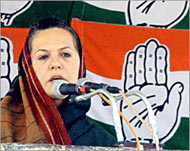Indian elections go down to the wire
More than 200 million Indians have gone to the polls in the final stage of India’s closely fought general election.

After they had done so on Monday, the future of the country’s economic reforms hung in the balance.
Exit and opinion polls show Prime Minister Atal Behari Vajpayee’s ruling coalition likely to emerge as the biggest bloc in parliament but falling short of an outright majority.
That result would put Vajpayee and his Hindu-nationalist Bharatiya Janata Party (BJP) scrambling for the support of smaller, populist parties to expand their existing 20-party coalition.
With the 79-year-old Vajpayee’s track record as a master of coalition politics and his reputation as a “moderate”, he remains the firm favourite to form a new government, analysts say.
But they warn that a shaky coalition would struggle to implement the next stage of economic reforms India desperately needs as its starts to emerge as a major economic player in Asia.
Impoverished masses
“Vajpayee is an advantage, because he is trusted by all his allies, and that is a very big plus for them,” said political analyst Mahesh Rangarajan.
|
“The next government will have to tackle it (India’s fiscal debt) on a war footing. This means they will have to cut back subsidies, which make the bulk of the deficit, very sharply” Prem Shankar Jha, |
“But the economic reform programme would be subject to more pressures and pulls, particularly when you look at privatisation, and labour reforms.”
Vajpayee called the election six months early to capitalise on a strong economy, a good monsoon and improved relations with old foe Pakistan.
But his party’s campaign motto “India shining” appears to have backfired among the country’s impoverished rural masses, who feel excluded from an economic boom which has mainly benefitted the urban middle classes.
As a result the election has become much closer to call, with the opposition Congress party led by Italian-born Sonia Gandhi gaining ground in the final weeks.
Monday’s final round of the three-week poll is the toughest test by far for Vajpayee’s BJP, with 182 seats up for grabs across 16 states.
Weak government?
The race is concentrated in the southern state of Tamil Nadu and the communist bastion of West Bengal, both large states where the BJP has little presence and has to rely on regional partners.
Opinion polls show the BJP and its allies struggling to win more than a third of the seats on offer on Monday.
Television polls predict they will win anywhere between 240 and 280 seats overall, with four out of five polls showing them falling just short of a majority in the 545-seat parliament.
Political commentators say Vajpayee should be able to form a government if his current coalition gets 250 seats, but with 240 or less and he could be in trouble.
Columnist Prem Shankar Jha says there is only a five per cent chance or less of a non-BJP government, but a much higher chance of a shaky coalition emerging with Vajpayee at the helm.
“The ruling alliance will be further weakened by the populist nature of the parties Vajpayee will be forced to woo,” he said.
Economic reform
“Even the capacity to continue the deliberate pace of economic reform, for instance, will be greatly impaired.”
|
|
|
Gandhi’s Congress Party has |
The biggest casualty, Jha and Rangarajan agree, will be efforts to rein in India’s stubbornly high fiscal deficit, running at more than 10% of gross domestic product if borrowing by central and state governments is added together.
The deficit has kept interest rates high, crowded out private investment and cut into funds needed to repair the country’s creaking infrastructure.
“The next government will have to tackle it on a war footing,” said Jha. “This means they will have to cut back subsidies, which make the bulk of the deficit, very sharply.”
Legislation requires the next government to bring revenues and spending into line by 2008. “That will require major cuts in subsidies,” said Rangarajan. “I don’t know how a government with even 300 seats could do it.”
But analysts see less risk of the peace process with Pakistan being derailed whatever the election result, even though efforts to repair relations have been driven mainly by the prime minister in the face of opposition from within his own party.
“At the bazaar level a chord has been struck,” said Rangarajan, adding that this year’s Indian cricket tour of Pakistan has helped foster a popular desire for friendly ties.
“It’s such a deep-rooted conflict one shouldn’t expect a rapid breakthrough,” he said. “But both sides have signalled a willingness to accommodate the other person’s mindset.”
